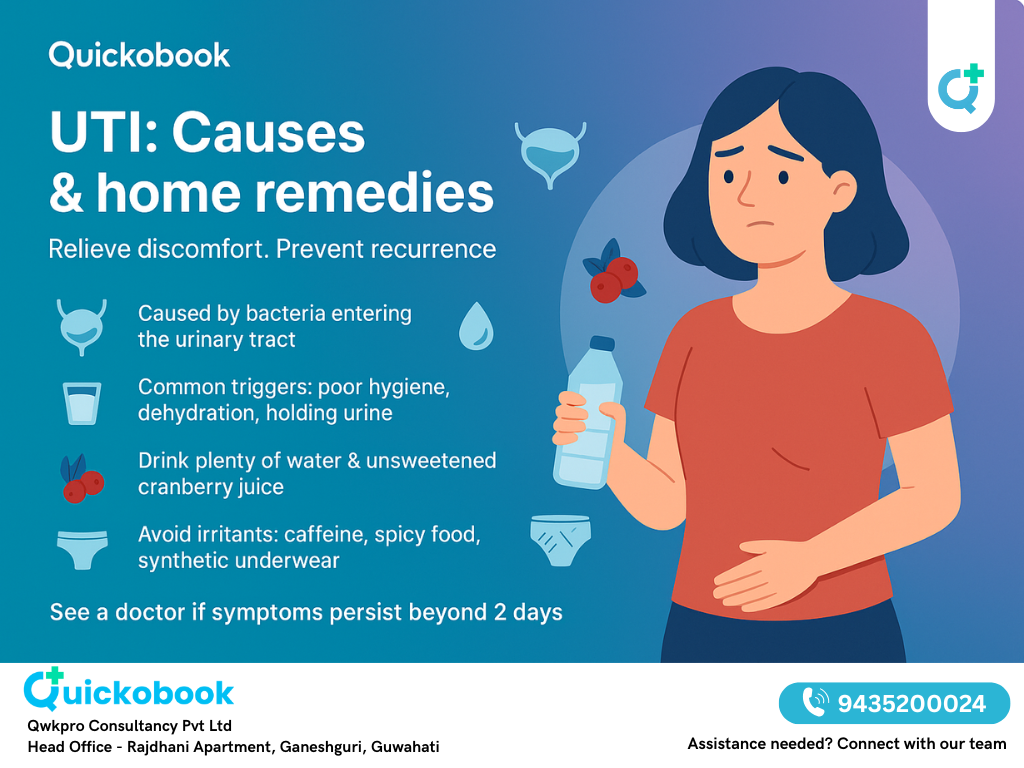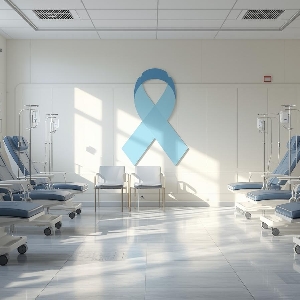Introduction
Urinary tract infections (UTIs) are one of the most common infections affecting both men and women, though women are at a higher risk due to anatomical factors. UTIs can affect any part of the urinary system—kidneys, ureters, bladder, or urethra. If untreated, a UTI can lead to a more serious kidney infection. Early treatment and preventive care are essential. With online platforms like Quickobook doctor consultation, you can easily connect with a gynaecologist or urologist for timely treatment.
What is a UTI?
A urinary tract infection occurs when bacteria (most commonly E. coli) enter the urinary tract and multiply. While some UTIs are mild and may improve with home remedies, others require medical treatment.
Causes of UTI
- Poor personal hygiene
- Holding urine for too long
- Sexual activity without proper hygiene
- Pregnancy-related hormonal changes
- Menopause (low estrogen levels)
- Use of catheters
- Blockages like kidney stones
- Diabetes and weakened immunity
Symptoms
- Burning sensation during urination
- Frequent urge to urinate
- Cloudy or strong-smelling urine
- Pain in the lower abdomen or back
- Blood in urine
- Fatigue or fever (in severe cases)
Home Remedies for UTI Relief
While UTIs often need antibiotics, these home remedies can support recovery and prevention:
- Stay Hydrated – Drinking 8–10 glasses of water helps flush out bacteria.
- Cranberry Juice – May reduce bacterial adhesion in the urinary tract.
- Probiotics – Yogurt and probiotic supplements restore healthy bacteria.
- Warm Compress – Applying heat to the lower abdomen reduces pain.
- Avoid Irritants – Cut down on caffeine, alcohol, and spicy foods.
- Frequent Urination – Do not hold urine; empty bladder regularly.
- Wear Cotton Underwear – Promotes airflow and reduces bacterial growth.
- Maintain Hygiene – Always wipe front to back after using the toilet.
When to See a Doctor
Consult a gynaecologist or urologist if you experience:
- Persistent burning or pain
- Blood in urine
- High fever or chills
- Recurrent UTIs (more than twice in six months)
- Symptoms of a kidney infection (back pain, nausea, fever)
Through Quickobook doctor consultation, you can seek timely advice and treatment without delays.
Risks and Complications
If untreated, UTIs can cause:
- Chronic kidney infection (pyelonephritis)
- Kidney damage
- Sepsis (life-threatening infection spread)
- Recurrent infections
Prevention Tips
- Stay well-hydrated
- Urinate after sexual activity
- Practice safe sex
- Avoid unnecessary use of antibiotics
- Boost immunity with a balanced diet and regular exercise
Conclusion
UTIs are common but manageable with proper care. While home remedies provide relief, timely medical advice is essential to prevent complications like kidney infection. If symptoms persist, consult a gynaecologist or urologist through Quickobook doctor consultation for safe and effective treatment.
Quickobook Call to Action
Book a Quickobook doctor consultation today.
Connect with trusted gynaecologists and urologists.
Get expert advice for UTI, kidney infection, and women’s health.
FAQs (50 Expert Answers)
Q1. What is a urinary tract infection (UTI)?
A1. A UTI is an infection in the bladder, urethra, or kidneys caused by bacteria.
Q2. Are women more prone to UTIs than men?
A2. Yes, because women have a shorter urethra, making it easier for bacteria to enter.
Q3. Can UTIs go away without treatment?
A3. Mild UTIs may improve, but most require antibiotics to prevent complications.
Q4. What causes frequent UTIs?
A4. Poor hygiene, sexual activity, and underlying conditions like diabetes increase risk.
Q5. Can pregnancy increase UTI risk?
A5. Yes, hormonal changes during pregnancy make women more prone to UTIs.
Q6. What is the link between UTIs and kidney infections?
A6. Untreated UTIs can spread to kidneys, causing serious infection.
Q7. Can men get UTIs?
A7. Yes, though less common, men can develop UTIs, especially with prostate issues.
Q8. Do children get UTIs?
A8. Yes, UTIs are common in children and require medical care.
Q9. Can cranberry juice cure UTIs?
A9. It may help prevent but does not cure UTIs.
Q10. Can UTIs cause blood in urine?
A10. Yes, hematuria is a common symptom of UTIs.
Q11. Is burning urination always a UTI?
A11. No, it may also be caused by dehydration or STIs.
Q12. Can I take antibiotics without prescription for UTI?
A12. No, always consult a doctor before taking antibiotics.
Q13. How can I prevent UTIs after sex?
A13. Urinate after intercourse and maintain proper hygiene.
READ ALSO: Vaginal Infections And Their Prevention
Q14. Do bubble baths cause UTIs?
A14. Yes, scented soaps and bubble baths can irritate the urethra.
Q15. Can diabetes increase UTI risk?
A15. Yes, high sugar levels promote bacterial growth.
Q16. Are probiotics useful for UTIs?
A16. Yes, probiotics help restore healthy bacteria in the urinary tract.
Q17. How long does a UTI last?
A17. With treatment, most UTIs clear in 3–7 days.
Q18. Can dehydration cause UTIs?
A18. Yes, low water intake reduces urine flow, allowing bacteria to grow.
Q19. What foods help prevent UTIs?
A19. Cranberries, yogurt, garlic, and vitamin C-rich foods are helpful.
Q20. Can a UTI cause back pain?
A20. Yes, back pain may indicate kidney involvement.
Q21. Are UTIs contagious?
A21. No, but bacteria can spread through sexual activity.
Q22. Can stress cause UTIs?
A22. Stress weakens immunity, making infections more likely.
Q23. Do UTIs cause fever?
A23. Yes, especially if the infection spreads to kidneys.
Q24. Can men ignore mild UTI symptoms?
A24. No, untreated UTIs in men may cause complications.
Q25. What role do gynaecologists play in UTI care?
A25. They treat UTIs in women, especially recurrent infections.
Q26. What role do urologists play in UTI care?
A26. They manage complicated or recurrent UTIs in both men and women.
Q27. Is frequent urination always a sign of UTI?
A27. No, it may also be due to overactive bladder or diabetes.
Q28. Can kidney stones cause UTIs?
A28. Yes, stones can block urine flow and allow bacterial growth.
Q29. Can UTIs affect fertility?
A29. Generally no, but untreated infections may cause complications.
Q30. Can home remedies replace antibiotics?
A30. No, they provide relief but cannot fully cure bacterial infections.
Q31. Do UTIs occur after menopause?
A31. Yes, reduced estrogen increases risk in older women.
Q32. How is UTI diagnosed?
A32. Through urine test and sometimes imaging if recurrent.
Q33. Can poor hydration cause cloudy urine?
A33. Yes, concentrated urine may appear cloudy.
Q34. Can sexual activity cause UTIs?
A34. Yes, bacteria can enter the urinary tract during intercourse.
Q35. Do condoms prevent UTIs?
A35. They help prevent STIs but may not fully prevent UTIs.
Q36. Can UTIs occur after surgery?
A36. Yes, especially with catheter use.
Q37. Can constipation cause UTIs?
A37. Yes, it can put pressure on the bladder and trap bacteria.
Q38. Do men need to see a urologist for UTI?
A38. Yes, men should consult a urologist for proper care.
Q39. Is drinking soda bad for UTIs?
A39. Yes, caffeine and sugar can irritate the bladder.
Q40. Can yoga help prevent UTIs?
A40. Yes, by improving immunity and circulation.
Q41. Can UTIs cause nausea?
A41. Yes, nausea may indicate kidney infection.
Q42. Can a UTI be a sign of another condition?
A42. Yes, frequent UTIs may indicate diabetes or kidney issues.
Q43. Are UTIs more common in elderly?
A43. Yes, due to weak immunity and bladder changes.
Q44. Can UTI cause bad smell in urine?
A44. Yes, strong odour is a common symptom.
Q45. Is UTI common in men with enlarged prostate?
A45. Yes, prostate enlargement can block urine flow.
Q46. Can untreated UTI be life-threatening?
A46. Yes, it can lead to sepsis in severe cases.
Q47. Can children prevent UTIs with better hygiene?
A47. Yes, proper toilet training and hygiene reduce risk.
Q48. Do I need to see a doctor for mild UTI?
A48. Yes, to confirm diagnosis and prevent complications.
Q49. Can Quickobook doctor consultation help with UTIs?
A49. Yes, you can consult a gynaecologist or urologist online for treatment.
Q50. What is the fastest way to treat UTI?
A50. Timely medical care with prescribed antibiotics is the fastest and safest way.
Disclaimer: This blog is for educational purposes only. It does not replace medical advice. Always consult a gynaecologist or urologist through Quickobook doctor consultation for proper diagnosis and treatment.










Comments (0)
No comments yet. Be the first to share your thoughts!
Leave a Comment